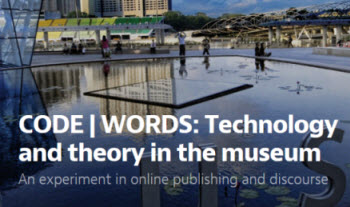
I’ve just re-read for the third time, Michael Peter Edson’s very powerful piece Dark Matter, the first essay in CODE/WORDS, a collaborative writing project about technology in museums.
Edson’s message to all of us involved with museums, libraries, and big data archives is to think MUCH BIGGER – way beyond tracking how many visitors come through the doors, or how many scholarly articles have come from connected researchers, or even how many page views a website has garnered.
There are over 3 billion people on line today, with another 5 billion predicted to join them over the next 10 years. Museums need to understand the unprecedented opportunity they have to engage users to participate in citizen-action science, archiving, and exploring - to use and share and help.
"There’s just an enormous, humongous, gigantic audience out there connected to the Internet that is starving for authenticity and good ideas—and they want to learn."
Tech innovation is leaping forward exponentially; the connected world we live in is changing almost faster than we can track. As keepers of the artifacts of human experience, museums, libraries and all related institutions need to prepare now for the open, democratic sharing of information that the World Wide Web provides and tech advances ensure.
It is no longer enough to just archive and digitize our huge collections (although that in itself is a HUGE undertaking). We need new platforms that allow each of us to explore those collections to gather facts, to ask questions, and to learn. FactMiners is one such platform and the Softalk Apple Project provides the pilot project on which to test it.
Recent comments